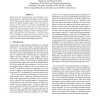Free Online Productivity Tools
i2Speak
i2Symbol
i2OCR
iTex2Img
iWeb2Print
iWeb2Shot
i2Type
iPdf2Split
iPdf2Merge
i2Bopomofo
i2Arabic
i2Style
i2Image
i2PDF
iLatex2Rtf
Sci2ools
ITC
2003
IEEE
2003
IEEE
On Reducing Wrapper Boundary Register Cells in Modular SOC Testing
Motivated by the increasing area and performance overhead caused by wrapping the embedded cores for modular SOC testing, this paper proposes a solution for reducing the number of wrapper boundary register cells. Since the very purpose of core wrappers is to provide controllability and observability for the cores-under-test, it is shown how the number of wrapper boundary register cells can be reduced without affecting the test quality. While a testing time overhead, caused by lower test concurrency, is incurred, there are clear benefits in reducing the necessary DFT area and especially in decreasing the propagation delays, which can improve the SOC’s functional timing performance.
| Added | 04 Jul 2010 |
| Updated | 04 Jul 2010 |
| Type | Conference |
| Year | 2003 |
| Where | ITC |
| Authors | Qiang Xu, Nicola Nicolici |
Comments (0)

